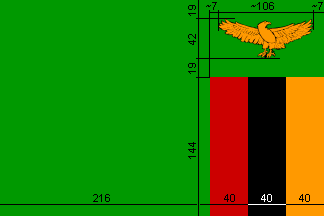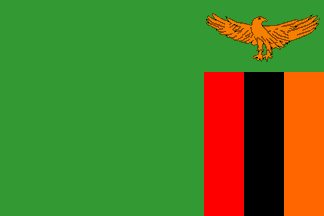 image by Željko
Heimer, 25 Nov 2003
image by Željko
Heimer, 25 Nov 2003
Last modified: 2008-03-22 by bruce berry
Keywords: zambia | rhodesia | federation of rhodesia and nyasaland |
Links: FOTW homepage |
search |
disclaimer and copyright |
write us |
mirrors
 image by Željko
Heimer, 25 Nov 2003
image by Željko
Heimer, 25 Nov 2003
Adopted 24 October 1964, modified 1996. Coat of arms adopted 19 February 1965.
According to François Burgos the flag of Zambia was changed in
1996. The dark green was substituted for a more clear green, and the eagle which was
slightly different from the one one the shield in the Arms, has been
changed to be more like the
one one the shield.
Jaume Ollé, 06 Sep 1998
Smith (1980)
reports that the current Zambian
flag is based on the flag of the ruling United National
Independence Party (UNIP), the movement which led the struggle for independence. However, according
to Flaggenmitteilung, the flag of UNIP was vertical green, white, red (4:1:1).
Željko Heimer, Jaume Ollé, 03 Aug 1997
 image by Željko
Heimer, 25 Nov 2003
image by Željko
Heimer, 25 Nov 2003
The Zambian flag is determined by the National Flag and Armorial Ensigns Act, Chapter 6 of the Laws of Zambia of 4 June 1965 amended by Act No. 13
of 1994 (the amendments does not alter the design of the emblems!).
Schedule I attached to the Act gives the construction details of the flag. The sheet gives
construction details in units making the flag 14 x 21 in size. Enlarging the numbers so
as to remove the fractions, it makes 224 x 336, the fly bars being 40 units each and 144 units high. The eagle is set in the center of the remaining green part in the fly, 42 units high. The
length of the eagle is not given, but from the measuring of the image it seems that 106 units would do well as approximate number. The same
eagle is used in the Coat of Arms and on the presidential flag (see below).
The Schedule further provides the description of the flag as well as the colour coding. I
suspect that the description might have been done by the College of Arms in
London:
"Green with orange coloured eagle in flight over a rectangular block of three vertical stripes coloured from left to right in red, black
and orange; of overall dimensions 3:2, and to the following colour
specifications:
(a) 'Spectrum Green', British Colour Council Shade reference 100
(b) 'Union Jack Red', British Colour Council Shade reference 210
(c) 'Jet Black', British Colour Council Shade reference 220
(d) 'Spectrum Orange', British Colour Council Shade reference 57"
It may be interesting to note that by the Subsidiary Legislation, the Regulations by the Minister, as amended in 1994, the flag is not free
to be hoisted by anyone as he or she wishes - it may be flown by any person only on explicitly named and numbered public holidays (Africa
Freedom Day, Heroes Day, Unity Day and Independence Day) and on other days as declared by the Minister.
In other occasions the flag is prescribed to be flown (my "shortening" of the "bureaucratic text"):
at state government buildings, local government buildings, statutory board or corporation buildings, state-aided schools and finally on
any motor car, boat or ship with the Minister of Government on board. Also, the Minister may give
permission for flying the flag on other
occasions, as he sees fit.
Željko Heimer, 25 Nov 2003
.gif) image
sent by Marko de Haeck, 24 June 2005
image
sent by Marko de Haeck, 24 June 2005
The arms consist of a shield with black and white wavy lines running
vertically, a representation of Victoria Falls.
Dipesh Navsaria, 08 Mar 1996
DK Pocket Book "Flags of the World" (1997) [u-udk97]:
"In the arms, the eagle which once appeared in the upper part of the shield,
forms the crest, above a crossed pickaxe and hoe. White and black bars
on the shield represent the famous Victoria Falls. The supporters are an
African man and woman and the motto on the base reads 'One Zambia, One
Nation'"
Ivan Sache, 27 April 1999
A pamphlet from the Government of Zambia
(undated) gives the following explanation of the Zambian coat of arms:
"The shield contains the colours of black and white, representing the
Victoria Falls.
The hoe and the pick above the shield represent the labours of the people of Zambia in agriculture and mining. The eagle represents the freedom of Zambia and the ability of the country to rise above its problems.
Supporters of the shield are a man and a woman - symbols of the African family. The man is dressed in bush shirt and shorts, the attire of a worker. The woman is in traditional dress. The mielie cob, the shaft of a mine, and a zebra imposed on the national colours (green) symbolise natural resources (agriculture, minerals, game, the land).
The scroll contains the National motto - "One Zambia, One Nation."
Specification of the Colours is given in the British Colour Council standard shades as follows:
Red - a
national
colour
BCC 210
Green - a national
colour
BCC 100
Black - a national
colour
BCC 220
Brown of the hoe and pick handles BCC 140
Brown of the man and
woman BCC 69
Khaki of the bush jacket & shorts BCC 67
Yellow of the
meilie
BCC 51
Gold of the
eagle
BCC 114"
Bruce Berry, 29 April1999
The Coat of Arms of Zambia is defined by the same law as the flag, namely the National Flag and Armorial Ensigns
Act with the Coat of Arms itself described and pictured in Part III of the Schedule.
SHIELD: Sable six pallets wavy argent.
SUPPORTERS: On the dexter side a Zambian man in Bush shirt, short trousers and sandals and on the sinister side Zambian woman
attired in traditional dress proper and both standing on a Compartment of vegetation thereon a Mine Shaft a Maize Cob and a
Zebra trotting all proper.
MOTTO: ONE ZAMBIA ONE NATION
Badge: (here shown surmounting the shield) An eagle head to the sinister or rising from a hoe and a pick in
saltire proper.
This Coat of Arms is referred to in the legislation as the Armorial Ensigns of Zambia.
Željko Heimer, 26 Nov 2003
Concerning the national arms shown here, I have some comments to add
after comparing Ivan's image with the one in 'Pavillons nationaux et
marques distinctives':
- both supporters should wear sandals
- the supporter on the viewer's right should have a yellow armband
on left arm
- there is a tiny zebra behind the right foot of the supporter on the
viewer's right
- there are a tiny derrick and factory behind the left foot of the
supporter on the viewer's left
- the stalk of the corn plant should extend over the ribbon.
These details are so tiny that there are probably impossible to show
in FOTW standard format.
Ivan Sache, 09 Jan 2001